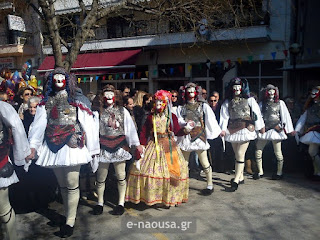The surprising history and cultural value of Carnival in Greece

By Marina Siskos Carnival celebrations in Greece vary notoriously across the country. Different regions, ascribe significance to various aspects of the celebration, from the historic, cultural, and symbolic elements of it, rendering it, one of the most motley festivals of the country. The highly inhomogeneous population of Greece confers to the variance for the ways we celebrate the Carnival and anticipate the Holy Easter. Some common elements that run through most celebrations, are the Carnival’s origin from god Dionysus, the custom of disguise into imaginary, animal or real entities, the evasion from social courtesy, the abolition of social norms and boundaries, the upheaval of the status quo, which also summarises the ritualistic spirit of the celebration. In Ancient Greece, god Dionysus, the child of Zeus and Semeli – who, according to the legend, was born twice, the first time as a semi-god and the second time in fully divine status – was honored in the temple of Zeus. The celeb